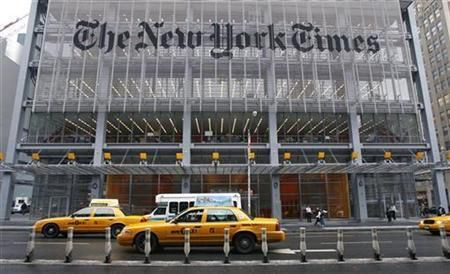New York Times Journalist Chris Buckley Required To Leave China

China's notoriously strict control over foreign news outlets in the country has made a high-profile victim, Chris Buckley of the New York Times, who was forced to leave the country after his press credentials were not renewed.
According to Jill Abramson, the Times' executive editor, the correspondent has been "forced to relocate" from Beijing to Hong Kong after his official press credentials and visa were not approved for renewal at the end of the year.
Officially, China has not technically expelled Buckley, nor has it rejected his application. Chinese regulations require that foreign media re-apply for official accreditation, and their work visas, every year. Perhaps in an attempt to assert power over the newspaper, China did not process Buckley's paperwork swiftly enough, allowing his previous accreditation to expire without issuing a new one. As a result, without a valid work visa, Buckley and his family were forced to leave mainland China. (Hong Kong is a "special administrative region.")
Buckley was quoted in the South China Morning Post as saying, “It’s a complicated situation, and I am not sure if you will use the word ‘expel’. I did not. My visa expired today and I did not receive a new visa."
Earlier in 2012, the Times caused an uproar among Chinese government officials with a story from Shanghai about Premier Wen Jiabao's family fortune. A spokesman for the Foreign Ministry, Hong Lei, said the piece "smears China's name and has ulterior motives."
After that, online access to the article, as well as to the rest of NYT.com, including its Chinese- language site, was blocked. However, the reporter who wrote the article, David Barboza, had his press credential and visa renewed.
So why Buckley over Barboza? Not renewing Barboza's credentials would have been too explicit of a move, allowing the media to make a direct correlation between the story and what would likely be reported as 'expulsion' from the country.
One blogger on Sinostand.com explained China's way of holding people accountable for aggravating the government.
"Dissidents and journalists accept (and often relish) the dangers of their work. Were David Barboza to be expelled, he’d have a pretty impressive claim to fame for the rest of his career. It’s much less impressive though to see a colleague pay for it by having to uproot his wife and young daughter from their home of 12 years."
Chris Buckley has lived in China for the past 15 years, 12 of which he spent as a reporter. Earlier this year, Buckley had press credentials with Reuters, and after taking his new job with the New York Times, he had to reapply. It is still likely that Chinese authorities will eventually issue Buckley new credentials with the New York Times, and are using this as a bureaucratic warning to other journalists wanting to dig up dirt on Party officials.
Buckley is currently in Hong Kong awaiting approval for his pending application.
© Copyright IBTimes 2025. All rights reserved.






















